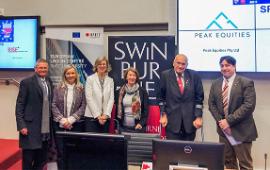Swinburne co-hosts Central European Business Forum

In Summary
- Central European Business Forum saw 80 participants discuss trade negotiations
- Focus on Free Trade Agreement negotiations between Australia and European Union
Educating Australian businesses about opportunities in Central Europe is key to stronger trade negotiations and collaboration, found a panel of experts at the fifth Central European Business Forum co-hosted by Swinburne, RMIT EU Centre and the Hungarian Consular Office in Melbourne.
Focusing on the Free Trade Agreement (FTA) and negotiations between Australia and the European Union (EU), representatives from Czech Republic, Hungary, Poland, and Slovakia came together to establish an initiative in Melbourne to educate local businesses about opportunities in the Visegrád Four countries.
Keynote speaker Ms Tanya Bennett, Director of the EU FTA Coordination Section, Department of Foreign Affairs and Trade, spoke about the rich historical connection built through immigration to Central European nations, saying it is a strong basis for engagement in business opportunities.
Ms Bennett also pointed out the commitment to free trade demonstrated by both Australia and the EU shows shared values and substantial opportunities for growth.
Keynote speaker Mr Anthony Weymouth, Senior Trade Commissioner of the Australian Trade and Investment Commission, said key Australian opportunities are in automotive, defence, education, food and wine, energy and resources sectors.
Mr Weymouth also pointed out the current trade imbalance in favour of Central and Eastern European countries, emphasising the opportunities for growth to Australian businesses.
A panel discussion following the keynote speeches was facilitated by Professor Bruce Wilson from the RMIT EU Centre, focusing on the opportunities and barriers to trade between Australia and Visegrád Four countries.
Panel members were:
- Ms Tanya Bennett – Director of the EU FTA Coordination Section, Department of Foreign Affairs and Trade (DFAT)
- Ms Rita Vágó – Trade Commissioner, Hungarian Consular Office in Melbourne
- Dr George Luk-Kozika OAM – Honorary Consul General, Poland
- Ms Eugenia Mocnay – Honorary Consul for the Slovak Republic in Victoria
- Mr Attila Gyarmathy – Operations Manager, Temperis Solutions, distributor of the Czech Sykora Living Solutions
The panel identified geographical distance, the complexity of regulations and international legal environment as the major barriers to market access and trade growth.
The panellists suggested that strong personal connections and business networks could reduce these barriers and expressed a desire to see the FTA ease legal barriers.
Questions from the floor highlighted the importance of establishing compliance in financial standards, mutual recognition of qualifications, protection of intellectual property and government support in enabling SMEs to access the benefits of the FTA under negotiation.
To conclude the forum, Swinburne lecturer in International Entrepreneurship, Dr Áron Perényi, identified opportunities for business services facilitating market access between the Visegrád Four countries and Australia.
Dr Perényi also suggested that further to the support provided by the International Visegrád Fund, there is room in the portfolio of DFAT hosted grants for one dedicated to Central Eastern European countries.
He proposed the FTA negotiations should consider making advancement regarding the transfer of credits in education, and mutual recognition of qualifications.
The event was sponsored by Peak Equities and the RISE Consortium, with student volunteers from Swinburne Business Without Borders contributing to the running of the event.

